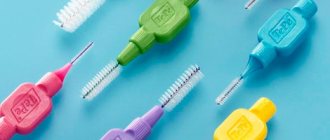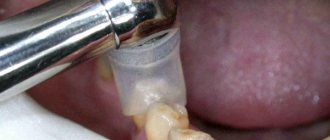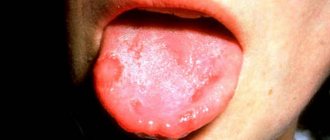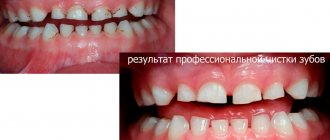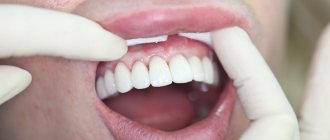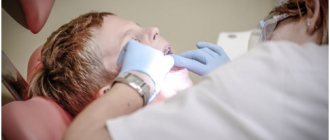body .attr-article__date{ background: none; padding: 0; }
NEAD EAD SEAD South Administrative District South-Western Administrative District CJSC Central Administrative District SZAO Northern Administrative District 01 02 03 05 06 07 08 09 1 0 1 1 1 2 14 18 15 16 17 Babushkinskaya Prospekt Mira Pervomaiskaya Baumanskaya Paveletskaya Teply Stan Shipilovskaya Prague Academic University Barrikadnaya River Station Oktyabrskoye Bratislava Taganskaya Academician Yangelya October Field
The call center is open 24 hours a day
Ambulance 24/7
Home Health from A to Z Useful information Preparing a child for the first visit to the dentist
Date of publication: 04/04/2016
until January 31
You get 10% cashback when purchasing a gift certificate More details All promotions
Is psychological preparation necessary for a child’s first visit to the dental office? - Of course, it is necessary. Its main goal is to prevent your child from feeling nervous or anxious before visiting the clinic, and to encourage the child to cooperate with the doctor.
Top tip:
Child at a dentist appointment
- If the reason for the visit is pain:
convince the child that the dentist will help - the pain will become less or go away completely. - If there is no pain and the first visit to the dentist is done as planned:
you should not try to prevent the child’s negative reaction by saying: “don’t be afraid,” “it won’t be scary,” “it won’t hurt.” He doesn’t yet know that he should be afraid of something. It is better to set your child up for a positive outcome from the visit.
You can say to small children: “The doctor will look at their teeth, brush them, and they will be happy.” For older children, rational argumentation is appropriate: “Go to the dentist, your teeth will be healthy and beautiful.”
Some more general tips:
- When going to the dentist, do not focus on this.
- Do not emphasize the importance, exclusivity, or even more so the unpleasantness of the event. A visit to the doctor should be a given.
- Don't say that the doctor won't do anything.
- This is not true, and then the child will understand that he was deceived. Tell them that the doctor will look at your teeth and treat them if they are sick.
- Do not use the “scary” words “prick”, “drill”, “drill”, “drill”.
- You can play at visiting a doctor.
Tell us how to enter an office, sit in a chair, open your mouth and keep it open. Do every action with your child, take on the role of a doctor.
Preparing children for dentistry: main problems
Young patients can be divided into three categories:
- The children have not yet been to the doctor, and the planned visit to the dentist will be the first.
- The first experience of communication turned out to be negative - the child is now afraid of the dental office and any manipulations.
- All previous meetings with the doctor took place in a positive direction, and the children have no negative emotions towards treatment.
If we talk specifically about fears, a child at the dentist may be afraid of:
- direct dental intervention - injections, drills, instruments;
- the doctor himself - rude attitude, sudden movements, appearance.
Any fear can be banished. Parents themselves can do this by patiently and thoughtfully relieving the child’s anxiety and correctly combining psychological communication techniques. Or through an adaptation visit to the dental clinic. In the second case, doctors who have undergone special education and training will deal with the child’s fears and show him that dental treatment is not scary.
Modern view on dental treatment in children
Modern technologies make it possible to perform dental treatment in Minsk in your sleep. Most experts agree that the child should not be subjected to unnecessary stress, but that it is better to treat all the teeth at once under sedation. In most cases, the child no longer needs to be persuaded for hours. While the child is sleeping, the doctor treats all teeth that need sanitation.
Advantages of dental treatment under anesthesia
- absence of stress and psychological trauma for the child;
- the opportunity to treat teeth with high quality;
- treatment is quick;
- You can perform all manipulations in one go: from treatment to removal.
Modern anesthesia drugs are absolutely safe for health; they are intended for short-term effects. During treatment, an anesthesiologist must be present to provide sedation. On the eve of dental treatment under sedation, the doctor will definitely collect an anamnesis to find out all possible contraindications.
In a dream, you can now both insert teeth and remove teeth .
How to take your child to the dentist: secrets of persuasion
Preparing children for dentistry includes individual and general recommendations. Adults need to behave reasonably and adhere to certain rules:
- Treats a future meeting with a dentist calmly – as an everyday event.
- If you have your own negative experience, do not discuss it with your children - pleasant events and quality treatment are worthy of mention.
- On the day of the appointment, maintain a good mood for the child - avoid any conflicts, quarrels, and also do not focus on the future meeting with the doctor.
- Avoid deception, talk correctly about the dental clinic and procedures. If you cannot find the right words to explain the dentist’s actions, it is better to sign up for a preliminary adaptation appointment, where specialists will competently talk to the child.
- Schedule an appointment within the framework of the child’s routine - so that the baby does not want to sleep, eat, go for walks and does not have to cancel significant school or extracurricular activities.
- Feed before visiting the dentist - about an hour and a half.
The best algorithm for all ages is systematic visits to the dentist from the moment the first baby teeth erupt. Frequent appointments create a routine attitude, and routine examinations prove that there is nothing scary in the dental chair. If you go to the dentist when your teeth already hurt, you definitely can’t do without preparation.
Rodikova Tatyana
“A child who visits the dentist every six months is immediately visible. The patient confidently enters the office, climbs into the chair without embarrassment, and does not need to be persuaded. The examination takes place without whims or tears, in an atmosphere of jokes and good stories. By the way, I would like to note that the teeth of such children are usually fine - clean, well-groomed, healthy.”
General advice applies to everyone: both children and teenagers. But there are also separate recommendations for each age.
Where can I find the tooth fairy?
Taking a child to the dentist is a responsible undertaking. The better you organize it, the better it will be for both the child and you.
First you need to find the right doctor. The most popular methods are still reviews on the Internet and word of mouth. However, when trusting the opinions of others, try to find out as many details as possible and compare them with your personal situation.
Ask other mothers whether their expectations from the doctor came true, clarify with what intention they went to the dentist and what they received in the end.
Try to “try on” the doctor on your son or daughter, imagine the baby’s reaction. Who does he trust more? A beautiful older aunt or uncle, strict but fair? Are you afraid of bearded people? Does he distrust people with glasses? All this is worth taking into account.
If you're not lucky the first time, don't despair and keep looking. But do not remain in the chair if you have doubts about the doctor’s competence or his approach to the child. A good pediatric dentist is always a psychologist. He knows how to capture a child’s attention, distract him, and chat.
Today, children's doctors try not to even pronounce words like “drill”, “rip out” - they replace them with euphemisms: instead of a filling they have “plasticine”, instead of a drill - a “tool” that allows them to apply tiny pictures to the tooth, and so on.
One of the mothers on the parent forum admitted that she and her daughter were lucky only on the fifth attempt - all the previous ones ended in tears and forced care, although the problem with her teeth was serious. But the persistent mother continued to look for the tooth fairy and met her in an ordinary district clinic - she managed to cope with the capricious girl practically without anesthesia, only by the power of persuasion.
First (repeated) trip to the dentist with a child 3-5 years old
Preparing a child for the dentist involves simple explanations of the doctor’s actions. Kids perceive the world through play, so the best ways to “talk” about reception are:
- game scenarios - examine the mouth of a soft hippopotamus, treat caries of baby teeth of a stuffed dog, play in the situation “a doll comes to the doctor”;
- various crafts and storytelling - make a tooth from plasticine and a harmful worm that is trying to damage the craft, or draw a “dirty” tooth and boldly erase the dirt with an eraser;
- watching cartoons - individual thematic tales about teeth and doctors, as well as series about visiting the dentist with your favorite cartoon characters;
- exciting teeth cleaning - during the process you can talk interestingly about the work of the doctor, removing dirt from teeth with a special vacuum cleaner and saving teeth from evil microbes.
If fear and mistrust persist, it is worth rescheduling the examination and making an initial introductory appointment. Having been in a beautiful office and touched all the tools, the baby will be imbued with confidence and will stop worrying.
Preparing a 5-8 year old child for dentistry
Age is not easy. Children already have their own opinions, ignore fairy-tale scenarios and have experience communicating with doctors. Even if the first visits to the dentist were successful, a preschooler may suddenly be afraid of a new visit.
Tips for parents:
- A detailed, correct story about the appointment - what the doctor will do, why you need to go to the dentist, what manipulations are possible.
- Authoritative opinion - dad, older brother or sister can talk about dental treatment, emphasizing the painlessness of the procedures and the friendliness of the doctors.
- Parents' trust - adults' emphasis on the fact that the doctor is wonderful increases the child's positive attitude.
Plaksina Margarita
“You shouldn’t ignore preparing for the reception of a schoolchild. Even with successful experience before! See for yourself. At the child’s previous appointment, for example, a baby tooth was removed. He did not cry and patiently endured dental procedures. But memories of slight discomfort could remain, and they could easily become the reason for refusing a new visit to the surgeon. Preparation will eliminate fear and help you communicate calmly with your doctor.”
From three to seven: let's talk!
Screenshot from youtube.com
Children from three to seven years old can already be interested and start a conversation with them. An excellent reason to start a conversation can be some piece of clothing, or a toy that the child took with him, or any little thing. I usually talk with our patients about animals - I tell them what kind of pets live at home, and share some funny stories.
There is no point in immediately explaining to your child what will happen to him now. It’s better to put everything in the format of a fairy tale.
We tell our patients a story about a microbe that settled in a tooth, for example. However, here you also need to not overdo it and monitor the reaction. After all, there are impressionable children - this microbe will appear in their dreams later. So sometimes you have to improvise.
To encourage or not: is it worth promising rewards after admission?
The issue of gifts for good behavior is controversial. Many psychologists advise avoiding such motivation, fearing future manipulations on the part of the child. However, there are two rules that will allow you to provide a positive reinforcement of experience and at the same time exclude a negative algorithm:
- Intangible reward. A visit to attractions, an interesting movie, or a relaxation in the routine will appeal to anyone and will leave positive emotions, enhancing the good impressions of a dental appointment or removing the negativity of a negative experience.
- Random present. Of course, a surprise will be planned, but the children don’t need to know about it. An unexpected trip to the cinema, buying a desired toy or book will lift your spirits and give you a boost of positivity.
The reward after a preventive examination or treatment is the decision of the parents. But dental clinic staff often hand out small gifts, certificates or memorable stickers to young patients, leaving a friendly reminder of the meeting.
Adaptation technique is the best preparation for a child
Unfortunately, the good intentions of adults to prepare a child for a visit to the dentist often end in failure. The random mention of words such as “pain”, “drill”, “prick” and the like terrify the child, depriving him of the ability to perceive constructive information. Also, many parents forget that the particle “not” is poorly perceived by children, so “it doesn’t hurt” and “it’s not scary”, kids hear exactly the opposite.
An alternative to unsuccessful dialogues is a professional approach. At an adaptation appointment - one or several - children will have a fun and educational experience in the dental world and learn the most interesting and kind things about it. Kids will no longer be afraid of dentists, schoolchildren will appreciate the friendly approach, and teenagers will gain confidence. The result of the meetings will be a positive perception of dentistry and a complete cure for dental phobia!
What to do if your tooth hurts?
When a child has a very painful tooth or swelling, treatment should not be delayed under any circumstances. If all attempts to persuade the child to undergo treatment fail, treatment under anesthesia is necessary. In the event that parents are categorically against sedation or it is not possible to carry it out, they have to go to public clinics or the maxillofacial department. While the dental surgeon performs all the manipulations, one or two nurses hold the child. This approach is considered outdated because it can cause psychological harm. This method may be justified in rare cases of health hazard, but it is better to avoid it.
Don’t forget about caries prevention, follow the rules of oral hygiene, and go to the doctor for examinations at least twice a year. Take care of your child's teeth.





